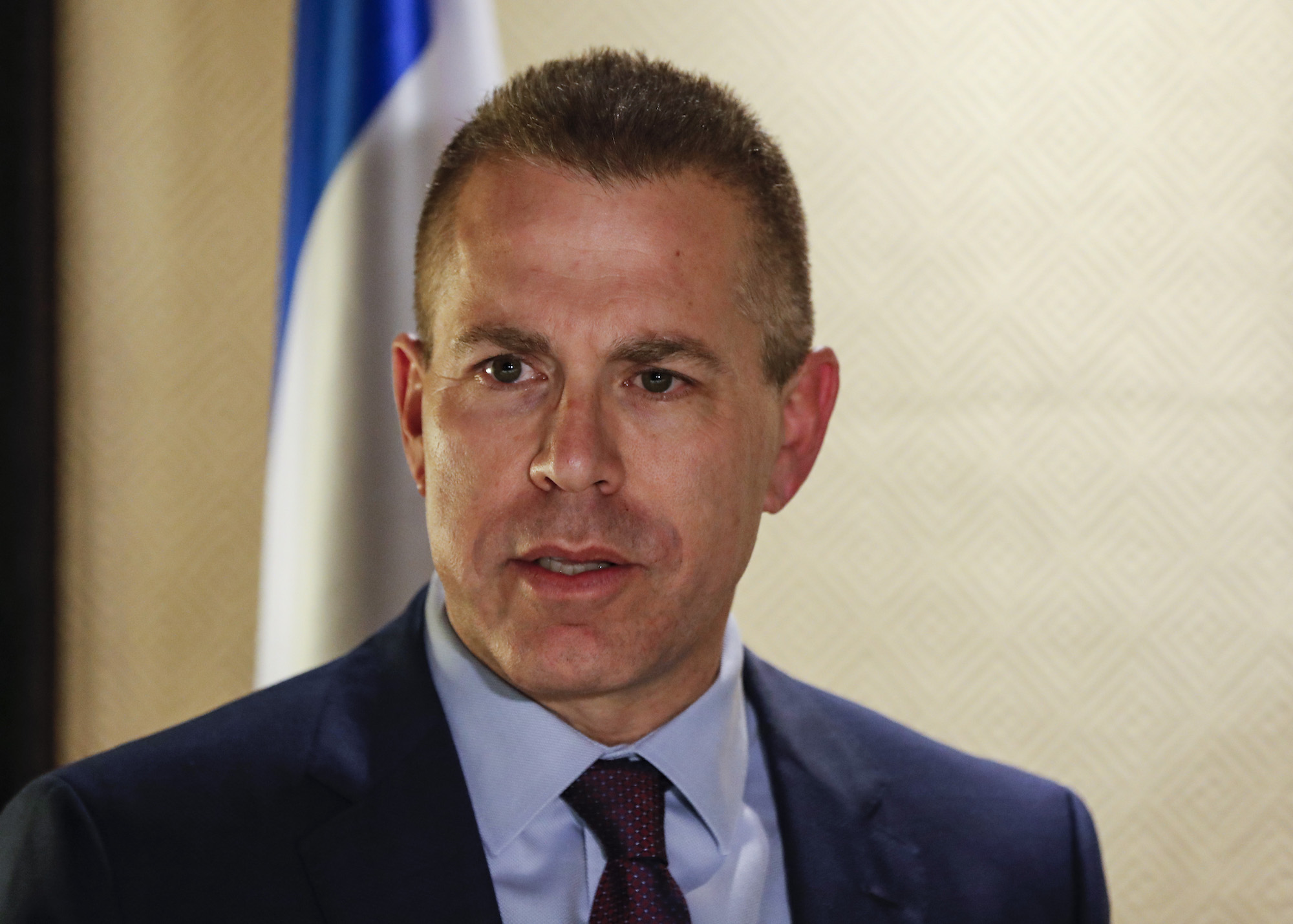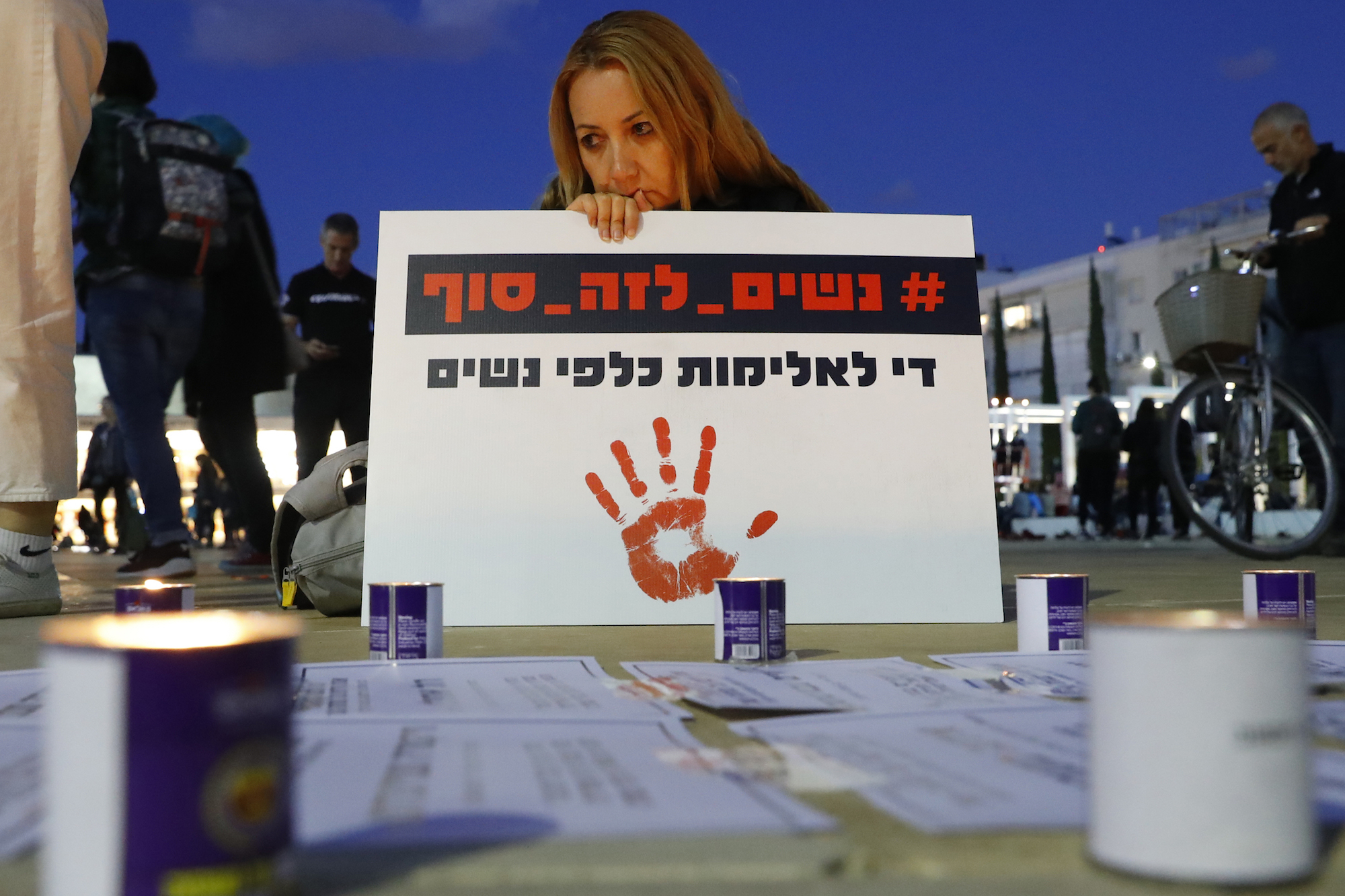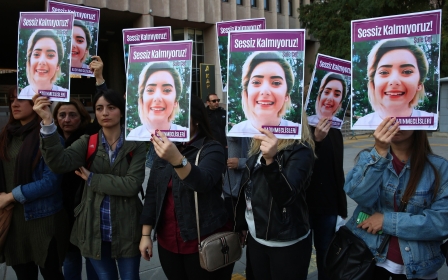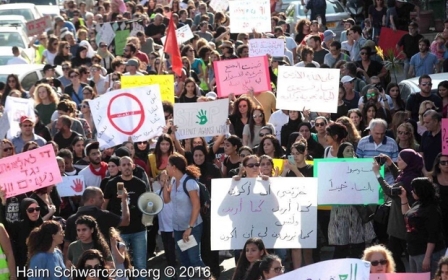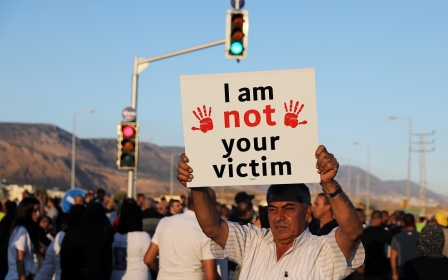Domestic violence: A side effect of Israel's trigger-happy state
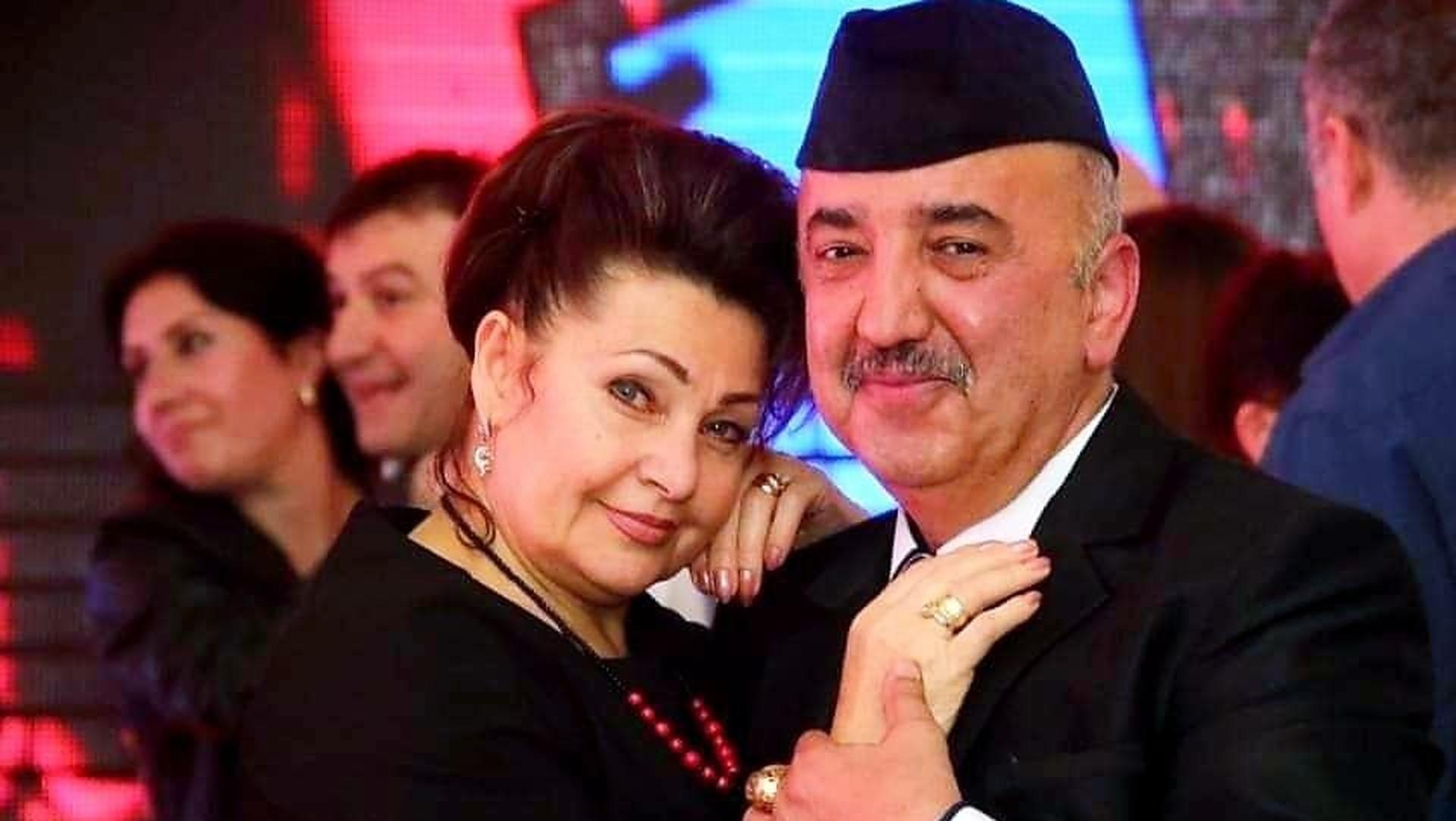
According to friends and neighbours, Slavic Mavashev, 62, and 57-year-old Yelena Itzhakbaev were in a loving relationship. There was nothing to intimate that the security guard for an educational institution would use his work weapon to shoot dead his partner of two years and then turn the gun on himself.
However, two weeks ago, Itzhakbaev's son stumbled across this bloody scene in the couples' shared apartment in the Israeli city of Petah Tikvah, about 10km east of Tel Aviv.
Based on authorities’ reconstruction of the crime scene, Mavashev shot Itzhakbaev several times in the upper torso and then committed suicide with a single shot.
Itzhakbaev was the fourth person since 2016 to be murdered by a security officer, making this recent murder-suicide part of a worrying trend.
In Israel, 10,000 restraining orders are issued each year, and the police open an average of 60 domestic violence cases on a daily basis
- Women’s International Zionist Organization (WIZO)
Figures released by the charity group Women’s International Zionist Organization) (WIZO) show that 10,000 restraining orders are issued each year, and the police open an average of 60 domestic violence cases on a daily basis.
New MEE newsletter: Jerusalem Dispatch
Sign up to get the latest insights and analysis on Israel-Palestine, alongside Turkey Unpacked and other MEE newsletters
Over the past 14 years, it says, more than 160 women have been murdered by their partners, with 50 percent of the victims already known to the welfare authorities.
In 2019 alone, at least 13 women were murdered by men close to them.
In a high-profile case last December, a prominent humanitarian doctor was indicted for the aggravated murder of his wife. Giora Praff, who media said was the first Israeli member of the Red Cross and had a history of domestic violence, shot Esti Ahronovich five times with a licensed handgun following an argument at their home.
A multi-layered phenomenon
At the governmental level, the broader context for femicide seems to be largely ignored. More than once, Israel’s Public Security Minister Gilad Erdan has been quoted describing the phenomenon as a “sectoral issue”.
He once tweeted an article challenging the data on the murders of women in Israel, calling it fictitious and designed to “further a hidden agenda”.
However on Monday, two weeks after the murder of Itzhakbaev by her security guard partner, Erdan announced that he would tighten gun laws in Israel and halve the number of security officers allowed to carry firearms after working hours.
Addressing the issue of firearms in everyday life is a crucial step towards reducing violence against women in Israel, campaigners say.
“For every woman murdered, there are countless others living under threat … We describe this as living under ‘coercive control’,” said Rela Mazali, co-founder and coordinator of Gun Free Kitchen Tables (GFKT), a project dedicated to limiting the presence of small arms in public spaces and in people’s homes.
“If the data says around 200,000 women live in a climate of domestic violence, all we can do is to describe what it is like for those of them living with an actual gun in the home.”
Founded in 2010, GFKT is now an inter-organisational coalition with more than a dozen organisations as members, including the Association for Civil Rights in Israel, Itach-Maaki - Women Lawyers for Social Justice, and Physicians for Human Rights - Israel.
According to the coalition, between 2002 and 2017, more than 35 innocent victims had been killed by security personnel handguns in locations other than their places of work. Of those 35, at least 18 were women murdered at family venues.
The substantial percentage of these deaths that involve women murdered by handguns belonging to security guards was not surprising. In a 2017 report, the group stated:
“GFKT galvanised a growing public awareness that small arms in the home and family multiply the risks faced by women and the chances of women's murders, while increasing the risks of murder and suicide overall.”
It also pointed to studies conducted in other countries that had shown that in homes where guns were present, the risk of women being murdered was three to five times greater than otherwise.
Many authorities around the world acknowledged the presence of firearms in the home as a clear risk factor, it added.
Small arms, big problem
For more than a decade, Israeli authorities have made several efforts to limit the use of small firearms in the country.
In 2005, a high-level expert commission concluded that Israel was over-armed. Up until now, the commission’s recommendations for fewer firearms in public spaces have yet to be fully implemented.
In 2008, the existing Firearms Law was amended to include Article 10C, restricting security guard gun licences to their places of work, but it was not enforced. In the five years following the amendment, 20 women were murdered by security guard handguns stored at home.
In 2013, Article 10C was finally enforced. And over the next four years, not a single person was killed at home by a security guard’s gun.
In Israel, there are more than 311,000 legally owned small arms in civilian areas, not counting the 400,000 or so illegal firearms
- Israeli police estimate
But a 2016 terror attack in Tel Aviv put the brake on the progress. Following the incident involving firearms, the law was amended again at the initiative of the minister of public security.
Erdan announced that he’d allow weapons to be taken home to “maintain public order and security”, a temporary authorisation that has since been automatically renewed every six months.
He actively encouraged ordinary citizens to arm themselves, aiming to “increase the number of civilians trained to use firearms, to make us stronger in the battle against terrorism”.
Hence, the conditions for issuing civilian gun licences were eased, and annual licence renewal was made simpler, almost automatic.
In 2016, the Knesset authorised the carrying of small arms outside the workplace, and in June of that year it authorised the first reading of a law to lower the age for receiving a gun licence, from 21 to 20.
Today in Israel, there are more than 311,000 legally owned small arms in civilian areas, according to an Israeli police estimate, not counting the 400,000 or so illegal firearms.
Power imbalance
The combination of firearms and masculinity doesn’t bode well for women facing abuse, say campaigners.
“We must also remember that most people with guns - about 97 percent - are men, who are a strong sector anyway. So to a situation in which the social reality is already unequal, we add the element of a weapon - mostly in the possession of those who are already stronger. Thus, that weapon is often turned on women,” said attorney Maysa Arshid, a legal adviser to the GFKT coalition.
While Israel's ad hoc regulations enabled security guards to take their guns home after working hours, there was a simpler solution, she said.
“After his shift, a security guard deposits his weapon at a police station near his workplace or in the office of the security company. People’s homes are not the place for storing weapons.”
So far the GFKT coalition has sued for damages twice on behalf of people injured by family members who kept their security-job handguns at home during a period when doing so was illegal.
In both cases, the district court validated an agreement made by the petitioner with the security company and the state, who were obliged to pay damages for not having prevented the incident.
These verdicts, for the first time, held the security companies and the authorities responsible for murder and injury, because they had not met their obligation to assure supervision of the weapons given to security guards.
The first of the two cases was brought in 2014 on behalf of Roman Lertovnekov, the only son of Bela and Boris Lertovnekov. The couple were murdered in 2008 by a relative who worked as a security guard, with his work-issued handgun.
The suit was brought against his employer, security company Reshef Bitachon, and against the state. The perpetrator was judged incompetent to stand trial and was hospitalised, where he remains.
The other suit was brought in 2011 by Elmenash Zalaka, a woman who survived an attempted murder involving a security guard’s handgun. Her partner, Avi Raday, shot and severely wounded her in front of their young daughter.
Zalaka sued the security company. She described scenes of daily menace over long periods, when Raday would play with his gun in her presence, taking it out at stressful moments.
Zalaka was awarded NIS 190,000 (approximately $55,000), one-third of it to be paid by the state and the rest by the security company.
Challenging the ‘lethal’ policy
The GFKT has filed a petition to the supreme court, arguing that the current small arms policy promulgated by Erdan is “lethal”, and that it remains in force “despite the fact that we no longer live with routine daily incidents of terrorism”.
The petition seeks a re-examination both of the auto-renewal of the ad hoc gun regulations and of the easing of requirements for obtaining a gun licence in the country.
In charge of the petition are Netta Loevy of Itach-Maaki Women Layers for Social Justice, and Anne Suciu of the Association for Civil Rights in Israel.
“Our most significant achievement thus far is that the court demanded that the state provide, within three months, the data supporting a need for these ad hoc regulations and for easing the criteria for obtaining a gun licence,” Loevy told MEE.
“In the language the court used, this is intended to introduce some kind of boundaries.”
She said the questions that need to be asked are: how many terror incidents have been prevented due to weapons taken into homes, and how many criminal incidents have been prevented.
The state’s side, citing the need for more time, responded with another request for renewal. “So far, the headquarters’ work is not complete… Under these circumstances, the minister decided to extend the ad hoc regulations for another two months,” it said.
Loevy said that the supreme court was now “demanding a concrete reason for the ad hoc instruction and the easing of gun licence requirements”, and that it was conducting its own research into the matter.
“People are still getting gun licences, but then, there is no way back,” she said.
Middle East Eye delivers independent and unrivalled coverage and analysis of the Middle East, North Africa and beyond. To learn more about republishing this content and the associated fees, please fill out this form. More about MEE can be found here.


